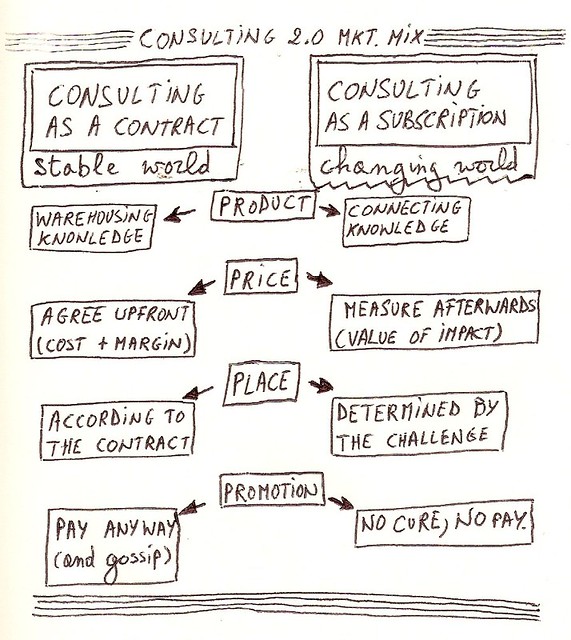What would our sector look like if we gave our value proposition a little twist? What would the results be like? The difference a subscription makes over a contract … “When you change the way you look at things, the things you look at change“
Until recently I thought that there was no alternative for ‘consulting as we know it’: onsite, full-time, fixed-rate, and mostly during office-hours. As it happens my net value as a knowledge worker varies according to the challenge at hand: sometimes I am solving a problem; other times I am filling a gap in operations and sometimes I invoice idle time (that frustrates the hell out of me).
The Switch
Knowledge follows different rules than a tangible product. If we want to get more value out of my services as a knowledge worker, we should use it differently: by means of a ‘subscription’ instead of a ‘contract’.
Let’s have a different look at the way knowledge workers go to market. In management science the elements of the marketing mix are often referred to as ‘the four Ps’: Product, Price, Place and Promotion. Because this model came into existence for selling tangible products, I have added a different emphasis as I address the 4 P’s below:

1. Product: Knowledge
Building a stock of knowledge made sense in a stable world. But in this rapidly changing world an inventory of knowledge gathers dust: the problems we face today cannot be solved with the knowledge of yesterday. The warehouse value of knowledge is close to 0.
The good news: knowledge gets better when it is shared and used where you need it and when you need it.
What if we used consultants no longer for building an inventory of knowledge and more for solving today’s problems?
2. Price: Value in Hindsight
For consulting, training and facilitation you can’t know in advance whether an intervention will create value. Sometimes it does, sometimes it doesn’t. And sometimes it exceeds expectations. The value of knowledge always appears in hindsight.
What if we agreed on the price of consulting after delivery? The price you pay is the value in hindsight. Instead of a proposal upfront we agree on added value afterwards.
3. Place: Plug-in
Let’s face it: most knowledge workers are not performing 100% every hour of the day. But at specific moments we perform 200% or 300%. That’s when we make the difference.
What if you could hire consultants at the moments when they make a difference? Plug-in when peak performance is needed, both onsite and online.
4. Promotion: Only the Knowledge you Care About
Customers who are satisfied with my services tell their friends. Don’t tell your friends when you paid me too much for a problem that was not fixed. Tell me. I will learn and in return you don’t pay.
What if you only paid when you were satisfied? ‘No cure, no pay’; that is: zero for online work and only the expenses for onsite work.
Old Wine in New Bottles
OK, now let’s imagine – only for a second – that this model would work and that the mainstream of all self-employed knowledge workers would switch over to consulting 2.0. What would be the consequences?
What About Parasites?
What if customers abuse you in order to get the value and then rate your services as bad so they can catch free rides? Rationally speaking I would be selling myself out of the market in no time.
But I’m an economist and I happen to remember Adam Smith, who is widely cited as the father of modern economics. In his work The Theory of Moral Sentiments, published in 1759, he critically examined the moral thinking of the time and suggested that conscience arises from social relationships.
In short: customers who are satisfied may give you a hard time, some will take a free-ride, but the majority will gracefully put the money where their mouth is.
And the other customers? You let them go as they continue to build a bad reputation for themselves.
Market Dynamics
In these times of ‘open source’, ‘open code’, ‘open access’, ‘open licenses’, etc. I consider it rather dangerous to go to the market with a ‘closed’ mindset.
‘Open contract’ is the answer for launching consulting 2.0. Again, this is not a new idea as the same Adam Smith mentioned it in 1776. That’s when he published The Wealth of Nations, in which he introduced the idea of an invisible hand to describe the self-regulating nature of the marketplace.
The point is that ‘open contracts’ will remove impediments for the market to tell you what you are good at. As an example, take the partner of a big consulting company that I met about a year ago. His philosophy is to say yes to every customer request for services, ‘and then I work my way out, because the customer will pay anyway’. This person is in for hard times in the new pricing model: No cure, no pay.
The market will tell you what you are good at and vice versa. To put it in the words of Adam Smith:
“It is not from the benevolence of the butcher, the brewer, or the baker that we expect our dinner, but from their regard to their own self-interest. We address ourselves, not to their humanity but to their self-love, and never talk to them of our own necessities but of their advantages.”

